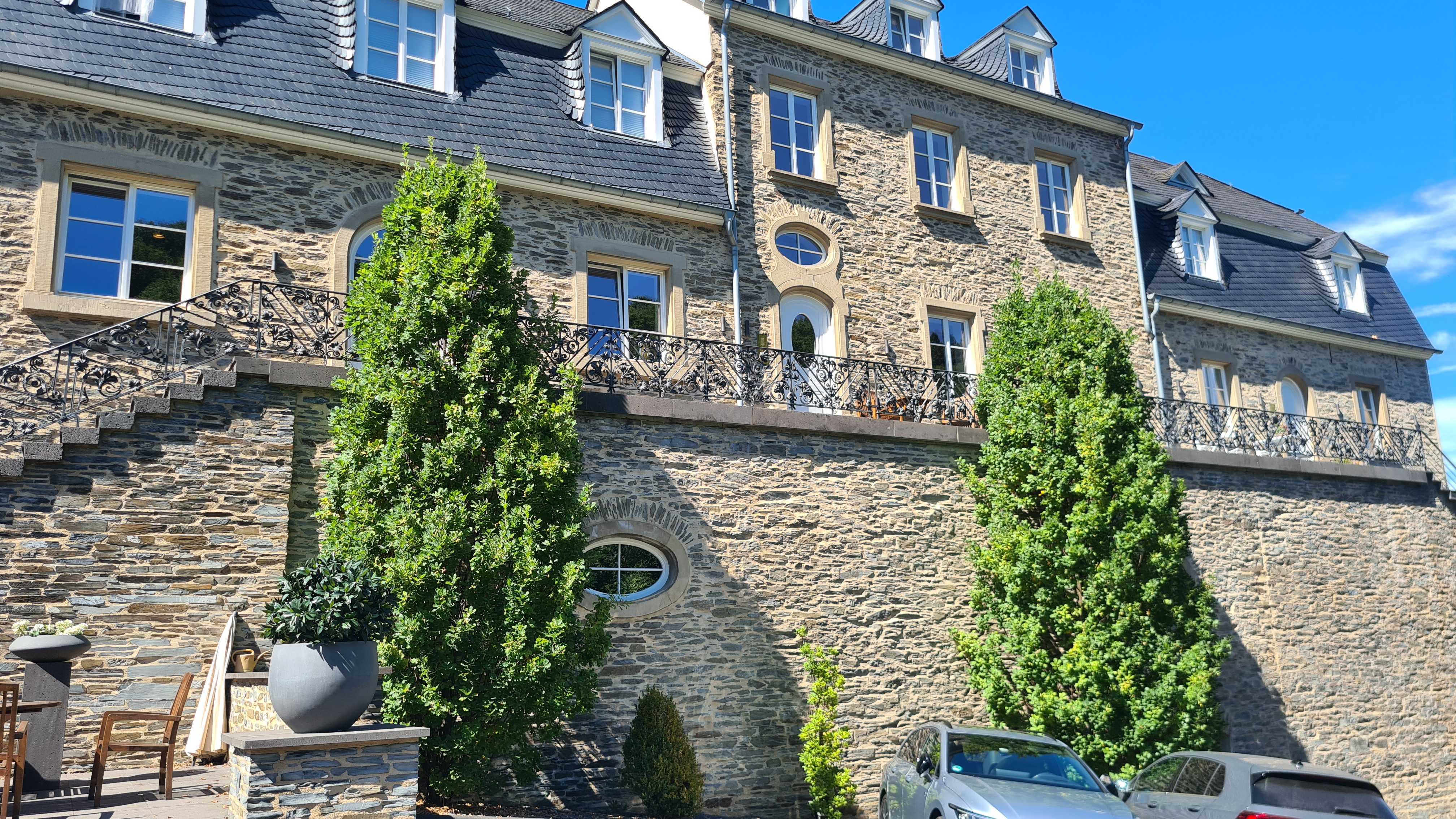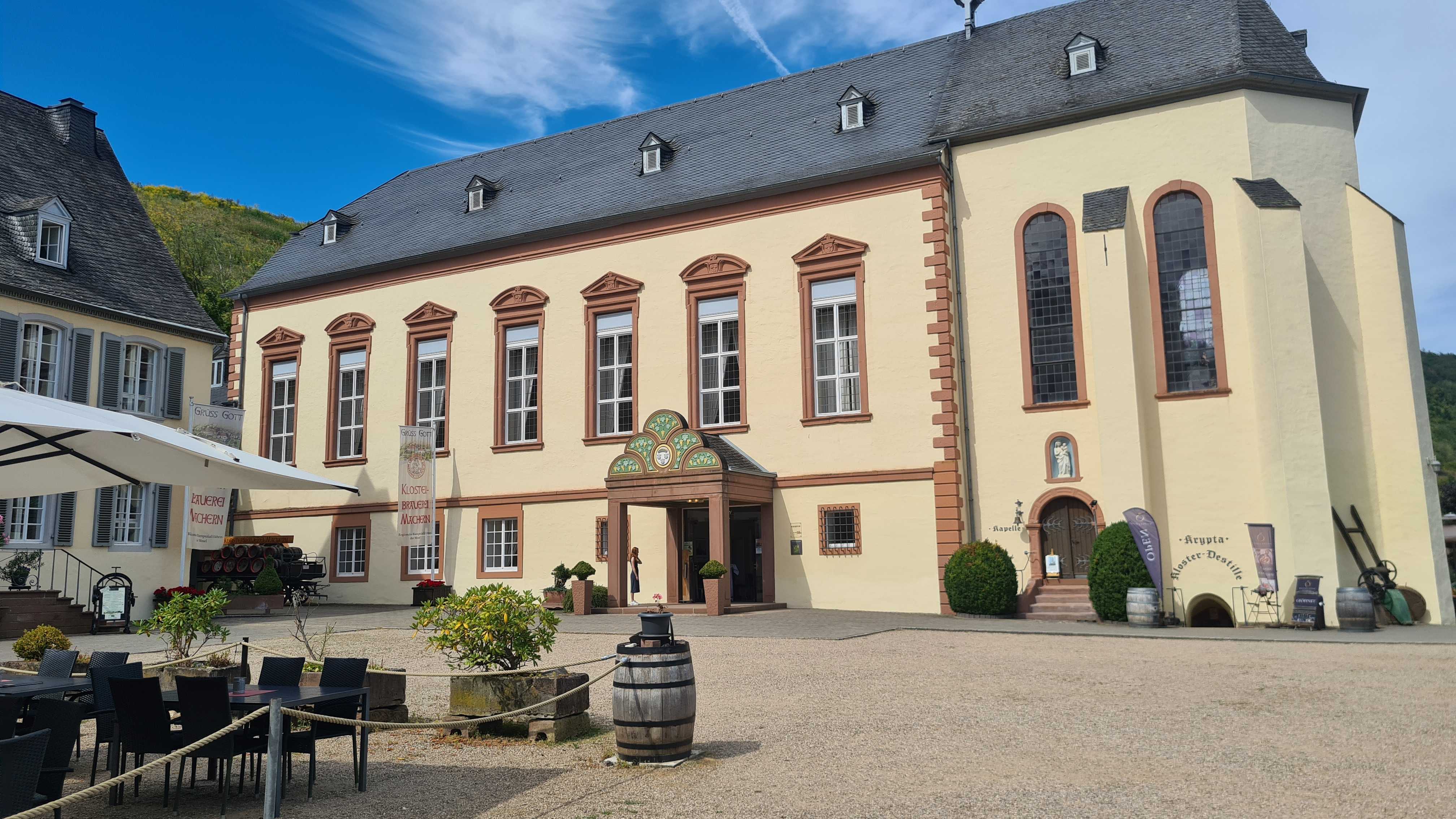Markus Molitor
Markus Molitor is the epitome of a winemaker who refuses to compromise. His mission has always been to put the Mosel back on the world wine map – and today, it’s hard to deny that he has been successful. With a portfolio ranging from dry everyday wines to intensely sweet, noble icons, he showcases the versatility of Riesling better than almost anyone else.
For wine lovers wanting to dive into the magic of Mosel, Markus Molitor is an obvious place to start, and a producer I always wanted to visit.
Learn more about Markus Molitor in this portrait of one of Mosel’s most dynamic producers.
By Patrick Qureshi, Head of Marketing at ShareWine
The History of the Estate
Today, Markus Molitor is one of the most iconic names in the Mosel Valley, but the estate’s story goes back much further. The Molitor family has been making wine for eight generations, and they were already mentioned as winegrowers in the Mosel as far back as the 1600s. However, the modern era began in 1984, when a 20-year-old Markus Molitor took over the family estate in Bernkastel-Wehlen.
At the time, the Mosel region was marked by inconsistent quality and declining demand for classic German wines. Many young winemakers chose to take different paths, but Markus Molitor had a clear vision: he wanted to restore Mosel’s reputation as one of the world’s leading Riesling regions. With an uncompromising approach to quality, extremely low yields, and meticulous vineyard care, he set out to elevate the family estate to international top-tier status.
Since the 1980s, Markus Molitor has expanded aggressively and now manages more than 120 hectares 15 top parcels along the Mosel, Saar, and Ruwer. This makes Markus Molitor one of the largest privately owned producers in the region. The estate is still 100% family owned, and Markus continues to lead the operation alongside a close-knit team of winemakers and vineyard workers. His daughter Helena has also begun to take an active role, representing the upcoming ninth generation.
Markus Molitor's Philosophy
Markus Molitor’s philosophy can be summed up in three key words: authenticity, terroir, and precision.
First, he aims to create wines that are authentic expressions of individual vineyards. This means that each wine should reflect its specific terroir – the soil, climate, and location. To preserve this authenticity, Molitor makes no compromises in the vineyard: no artificial fertilizers, strict green harvesting, and often multiple manual passes during harvest to select only the best grapes.
Second, terroir is central to production. Mosel’s steep slate slopes produce wines with a unique combination of minerality, freshness, and aging potential. Markus Molitor is convinced that Riesling is the grape that best expresses these qualities, although he also cultivates Pinot Noir and a small amount of Pinot Blanc.
Finally, precision in the cellar is essential. Molitor uses spontaneous fermentation with the grapes’ natural yeasts. The wines are often aged for extended periods in large, old wooden barrels (fuder), which adds complexity without overshadowing the purity of the fruit. A notable detail: Molitor does not use chaptalization (adding sugar) or artificial acid adjustments. Everything comes from the grapes themselves.
The result is wines with remarkable clarity, almost surgical acidity, and a balance of intensity and finesse that has made the estate famous far beyond Germany – especially on the ShareWine marketplace, where his popularity is unmistakable.
Fun Fact: Markus Molitor is known for his perfectionism. In some harvest years, he walks through the vineyards up to 15 times to pick grapes at the exact right moment.

Vineyards and Location
Markus Molitor’s estate is located in Wehlener Klosterberg, one of Mosel’s most famous vineyard areas. From here, he manages a mosaic of parcels stretching across the Mosel, Saar, and Ruwer. Some of the most prestigious vineyards include:
Wehlener Sonnenuhr – one of Mosel’s most legendary vineyards, known for elegant and mineral Rieslings.
Ürziger Würzgarten – famous for its red volcanic soil, which gives spicy and powerful wines.
Bernkasteler Doctor – one of the most expensive vineyards in the world; Molitor owns small parcels here. The wines are extremely concentrated with huge aging potential.
Zeltinger Sonnenuhr – produces refined, floral wines with great complexity.
Scharzhofberg (Saar) – a historic terroir where Riesling shows a special crispness and cool elegance.
These vineyards all share one thing in common: steep slate slopes, often with gradients of 60–80 degrees. The vineyard work is primarily done manually, as even caterpillar machinery is difficult to use on these slopes. This makes cultivation both time consuming and expensive, but according to Molitor, the hard work is the key to quality.
The Wines of Markus Molitor
Markus Molitor produces a huge range of wines, from bone dry Rieslings to intense noble sweet Prädikat wines. To make the range more accessible to consumers, he introduced a color-coded capsule system:
White capsule – Dry wines (Trocken)
Green capsule – Off-dry / Feinherb wines
Gold capsule – Sweet wines (Spätlese, Auslese, Beerenauslese, Trockenbeerenauslese, and Eiswein)
This system makes it easier to navigate the wide selection, which often includes 60–100 different wines in a single vintage. In addition to the capsule color, many wines are also marked with 1–3 small stars, indicating their level of complexity. While practical, this system also contributes to the overall confusion surrounding German Rieslings, where wine lovers have to navigate producers, vineyards, classifications, sweetness levels, capsule colors, and stars – with plenty of exceptions to the rules.
As a wine enthusiast newly captivated by German Riesling, this can feel like an overwhelming universe to explore – though one well worth tasting your way through.
Markus Molitor does not produce wines under the Grosses Gewächs (GG) label, even though many of his vineyard sites would likely qualify.
The reason is that GG is an official classification managed by the VDP (Verband Deutscher Prädikatsweingüter), and Markus Molitor is not a member of the VDP. Instead, he works with his own, widely respected capsule system (white, green, and gold), which denotes sweetness level and style.
In practice, Molitor’s dry single-vineyard wines from sites like Wehlener Sonnenuhr or Bernkasteler Doctor easily rival (and sometimes surpass) many GG wines from Mosel and beyond. These are often referred to as “Molitor’s unofficial GGs.”
The Main Wine Types:
Gutsriesling – the estate’s entry-level wine, a calling card of the house style: pure, crisp, and mineral-driven.
Single-vineyard wines – often vinified in multiple styles (dry, off-dry, sweet) from the same parcel. The most sought-after bottles come from Wehlener Sonnenuhr and Bernkasteler Doctor.
Pinot Noir (Spätburgunder) – Molitor’s red wines are gaining increasing recognition.
Noble sweet specialties – Beerenauslese, Trockenbeerenauslese, and Eiswein. Produced only in the best years and in extremely small quantities, but capable of aging for decades.
Tasting Markus Molitor’s Wines
If you plan to visit the Mosel, it's often necessary to prepare in advance to secure wine tasting appointments. Many top producers do not receive visitors at all. They typically refer people to wine bars or restaurants in nearby towns where their wines can be sampled.
Markus Molitor, however, is open to visits, and you can book a tasting for a modest fee, usually including tasting of 9–12 different wines. The concept is simple: together with one of the estate’s staff, you select the wines you'd like to taste, and they will pour and present them.
The staff at Markus Molitor speak excellent English, so even if your German isn’t strong, you’ll be able to ask questions and engage in the tasting. It’s also possible to buy wines on site which is always a plus.
That said, it's clear that Molitor receives a high volume of visitors, so the experience can feel more commercial and routine than personal and authentic.
A Pro Tip: visit the wine bar at Kloster Machern, just 300 meters from Markus Molitor. There, you can enjoy Molitor’s wines outside in the courtyard, and the knowledgeable sommelier can guide you through a wide selection available by the glass. There’s also a small wine museum and shop – well worth a visit.

Frequently Asked Questions About Markus Molitor Wines
It’s Molitor’s way of indicating sweetness level: white (dry), green (off-dry), gold (sweet).
Yes, especially the Rieslings from top sites can evolve over 20–40 years. The noble sweet wines often last even longer.
The majority, yes. But Markus Molitor also produces excellent Pinot Noir and a small amount of Pinot Blanc.
A combination of extreme purity, precise acidity, clear minerality, and long finish. Even the sweet wines remain fresh and never cloying.
It’s Molitor’s way of indicating sweetness level: white (dry), green (off-dry), gold (sweet).
The majority, yes. But Markus Molitor also produces excellent Pinot Noir and a small amount of Pinot Blanc.
Yes, especially the Rieslings from top sites can evolve over 20–40 years. The noble sweet wines often last even longer.
A combination of extreme purity, precise acidity, clear minerality, and long finish. Even the sweet wines remain fresh and never cloying.